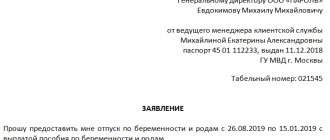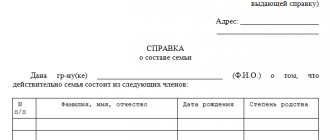Rights of the child in the family
In a family, a child is entitled to the following rights:
- Know who his blood parents are.
- Live in your own family, together with relatives.
- To be accepted into the family unit, regardless of its location.
- Have respect from society and mom and dad.
- Count on the protection of your rights and legitimate interests.
- Receive financial support from parents, as well as required benefits from the state.
- Own property.
- Use common family material assets.
- 9. Freely express your own opinion.
- Receive free medical care.
- Have protection from information that has a negative impact on development.
- Obtain citizenship of the country, general compulsory education.
- Have your own last name, first name and patronymic.
Note!
Those children who do not have a family to begin with or have lost one for some reason have the right to count on government assistance.
What rights do teenagers under 14 have?
Of course, there are not as many of them as in an adult, but, nevertheless, they exist, and parents need to remember this.
Please note: minors cannot be hired for jobs with heavy physical exertion, financial responsibility or production with hazardous chemicals.
Civil Code of the Russian Federation);
- from 2 months the child has the right to receive preschool education (Article 67 of the Federal Law “On Education in the Russian Federation”);
- From the age of 6, a child (in accordance with Article 28 of the Civil Code of the Russian Federation) has the right to independently perform:
Responsibility of minors under 14 years of age:
- Criminal liability for particularly serious acts committed.
- Administrative responsibility falls on the shoulders of the minor and is reimbursed at his own expense, partly at the expense of his parents.
It is proposed to reduce the age to 12 years. This is due to the large number of wild and brutal murders committed by teenagers aged 9 to 14 years. Let's get back to the good stuff. Article 63 of the Labor Code of the Russian Federation allows for the possibility of concluding an employment contract with a student who has reached the age of 14 to perform light labor in his free time from school.
FROM 14 YEARS OLD, the minor himself bears property responsibility for the damage caused, provided that he has his own income (earnings, scholarship). Legal representatives compensate for the damage caused to minors in the missing part.
Employment of persons over 14 years of age is permitted. Based on Part 3 of Article 63 of the Labor Code of the Russian Federation, the mandatory conditions for concluding an employment contract with this category are: written consent of one of the parents (guardian, trustee) and the guardianship and trusteeship authority; work should not interfere with studies; the work should be easy and not cause harm to the teenager’s health.
Article 70 of the Labor Code of the Russian Federation indicates that the organization does not have the right to establish a probationary period for a minor. Before starting to work in an organization, a minor is required to undergo a medical examination (Article 266 of the Labor Code of the Russian Federation). Thereafter, the employee must undergo a medical examination annually until he reaches 18 years of age.
This is important to know: In what cases does the payment of child support stop?
The article will also talk about at what age you can start training, at what age you can get the coveted license, and in what cases you can start driving a car.
But there are also those rights that a person acquires as he grows up. Most often, they directly depend on the legislative structure of the state in which the child was born and raised.
Non-property include:
- ensuring viability;
- have a family and be raised in it;
- availability of full name;
- registration at place of residence;
- education;
- health protection;
- leisure;
- work;
- self-expression;
- protection of your rights and interests.
Between the second and third stages of growing up there is an intermediate stage, not distinguished by psychologists as a separate, middle stage - from 14 to 16.
Every child should be a law-abiding citizen of his society, i.e. respect the rights and freedom of others and not commit offenses or crimes. It is also mandatory to receive basic general education.
Already at birth, every person is endowed with a number of rights, the list of which not only increases as he grows up, but is also supplemented by responsibilities.
It is from this moment that he has the opportunity to find a part-time job, but for this he must obtain the consent of his parents. However, he can devote only a few hours a day to her.
Referred to as a minor, has partial legal capacity and CAN: CIVIL LEGAL CAPACITY is the ability to bear rights and responsibilities recognized equally for all citizens from birth to death. Has incomplete legal capacity. From the age of 14, a child HAS THE RIGHT: In accordance with the law, at the age of 14, every citizen of Russia MUST OBTAIN A PASSPORT.
According to the UN Convention, every child has an unconditional right to life, development and protection of his rights. Children also have the right to an active life in society. A teenager also has certain rights in the family. So, starting from the age of 14, children can already manage their own money and, if necessary, invest it in bank accounts.
From the age of 6 the following are added: Rights:
- make small everyday transactions, make transactions aimed at obtaining benefits free of charge, which do not require notarization or state registration;
- make transactions to dispose of funds provided by parents or other people, with the consent of the parents, for a specific purpose or free disposal. (Article 28 of the Civil Code of the Russian Federation).
Responsibilities towards parents
Of course, every child is obliged to respect conscientious parents and honor family traditions. But this is a conditional rule. That is, this will be the result of raising the offspring. The main responsibility of an adult able-bodied child is their financial support. This also includes respect for the rights and freedoms of adults, as well as the safety of material values.
Legal basis
The main responsibilities of children are reflected in Chapter 13 of the Family Code of the Russian Federation. In particular, this is discussed in Articles 87 and 88. Thus, it is stated that children not only must pay alimony, but also take part in other expenses of their parents.
What rights do children have?
Every child should know their rights in order to use them when necessary. Since children do not have access to information that would inform every child about their rights in a clear and accessible form, and from their parents and other adults one can often only hear “you must . “Children need to be told about their rights. From an early age we must accustom them to the idea that they are citizens, just like adults.
All child rights can be divided into two types:
property, which include:
the right to receive maintenance from one's parents and other family members;
the right to receive child benefits and maternity capital from our Motherland;
the right of ownership of income received by him, of property acquired with the child’s funds;
the right to own and use the property of parents with their consent when living together with them;
non-property, which include:
in secondary specialized and higher educational institutions.
live and be raised in a family;
communicate with parents and other relatives;
to protect their rights and legitimate interests;
express your opinion, as well as take into account the opinion of a child who has reached 10 years of age.
In addition, with different relationships, parents may have various kinds of questions, the resolution of which has a special nature, for example:
provision of medical services, incl. — vaccinations;
relations when passing the State Examination and the Unified State Exam;
Rights of a child depending on his age
Another criterion by which all the rights of a child can be divided is his age:
From birth, every child has the right to:
citizenship (Article 6 of the Constitution of the Russian Federation, Article 12 of the Federal Law “On Citizenship of the Russian Federation”, according to which a child acquires citizenship of the Russian Federation by birth if on the child’s birthday both of his parents or his only parent have citizenship of the Russian Federation (i.e. according to the principle "right of blood");
has the right to protect his rights and legitimate interests (Article 56 of the Family Code of the Russian Federation);
health protection (Article 41 of the Constitution of the Russian Federation);
live and be raised in a family, know your parents, receive from them protection of your rights and legitimate interests (Article 54 of the Family Code of the Russian Federation);
communicate with parents and other relatives (Article 55 of the Family Code of the Russian Federation);
Also, from birth, every person has legal capacity , i.e. the ability to have civil rights and bear responsibilities (Article 17 of the Civil Code of the Russian Federation);
from 2 months the child has the right to receive preschool education (Article 67 of the Federal Law “On Education in the Russian Federation”);
From the age of 6, a child (in accordance with Article 28 of the Civil Code of the Russian Federation) has the right to independently perform:
small household transactions (i.e. transactions that are insignificant in amount and are aimed at satisfying the child’s household needs, i.e. his personal consumer needs, which are covered by the Law of the Russian Federation “On the Protection of Consumer Rights”);
transactions aimed at obtaining benefits free of charge, which do not require notarization or state registration;
transactions for the disposal of funds provided by a legal representative or with the consent of the latter by a third party for a specific purpose or for free disposal.
from 6 years and 6 months, a child has the right to receive primary school education (Article 67 of the Federal Law “On Education in the Russian Federation”);
from the age of 8, a child has the right to join children's public associations (Article 19 of the Federal Law “On Public Associations”).
Rights of a child from 10 years of age
From the age of 10, a child has the right:
express his opinion when deciding in the family any issue affecting his interests, as well as be heard during any judicial or administrative proceedings. Taking into account the opinion of a child who has reached the age of ten is mandatory, except in cases where this is contrary to his interests (Article 57 of the Family Code of the Russian Federation);
This is important to know: Is it possible to get a mortgage for an apartment for a child?
express his opinion about which of his parents, who are divorcing the marriage in court, he would like to live with after the divorce (Articles 57 and 65 of the Family Code of the Russian Federation);
give consent to change your first and (or) last name (clause 4 of Article 59, clause 4 of Article 134 of the Family Code of the Russian Federation, clause 3 of Article 143 of the Family Code of the Russian Federation);
give consent to the restoration of parental rights (clause 4 of Article 72 of the Family Code of the Russian Federation);
give consent to your adoption or transfer to a foster family (clause 1 of Article 132 of the Family Code of the Russian Federation);
give consent to the entry of the adoptive parents in the birth register as the parents of the child adopted by them (clause 2 of Article 136 of the Family Code of the Russian Federation);
give consent to the appointment of a guardian (clause 4 of Article 145 of the Family Code of the Russian Federation).
Rights of a child from 14 years of age:
give written consent for the acquisition or termination of Russian citizenship (Article 9 of the Federal Law “On Citizenship of the Russian Federation”);
can choose (with the consent of the parents) place of residence (Articles 20, 26 of the Civil Code of the Russian Federation);
make any transactions (with the written consent of the parents - Article 26 of the Civil Code of the Russian Federation);
has the right to independently dispose of his earnings, scholarships, and other income (Article 26 of the Civil Code of the Russian Federation);
exercise the rights of the author, the result of his intellectual activity protected by law (Article 26 of the Civil Code of the Russian Federation);
make deposits in credit institutions and manage them (Article 26 of the Civil Code of the Russian Federation);
conclude (with the consent of one of the parents) an employment contract (Article 63 of the Labor Code of the Russian Federation);
demand cancellation of adoption in cases specified in the law;
learn to drive a motorcycle;
join youth public associations (Article 19 of the Federal Law “On Public Associations”).
Responsibilities of a child from 14 years of age:
obtain a passport (clause 1 of the Regulations on the passport of a citizen of the Russian Federation (approved by Decree of the Government of the Russian Federation of July 8, 1997 No. 828);
be responsible for your actions in the form of:
property liability for concluded transactions, as well as for causing property damage (Article 26 of the Civil Code of the Russian Federation);
criminal liability for serious crimes (Article 20 of the Criminal Code of the Russian Federation).
Rights of a child from 15 years of age:
- leave (with the consent of the parents) the general education organization until receiving basic general education (Articles 43, 66 of the Federal Law “On Education in the Russian Federation”)).
Rights of a child over 16 years of age:
may be declared fully capable ( emancipation ) if he works under an employment contract or is engaged in entrepreneurial activities (Article 27 of the Civil Code of the Russian Federation);
may be a member of a cooperative (Article 26 of the Civil Code of the Russian Federation);
enter into marriage with the permission of local government bodies if there are good reasons (Article 21 of the Civil Code of the Russian Federation, Article 13 of the Family Code of the Russian Federation);
can obtain a license to drive a motorcycle;
has the right to independently conclude an employment contract (Article 63 of the Labor Code of the Russian Federation);
Responsibilities of a child over 16 years of age:
bears administrative responsibility;
bears criminal liability for any crimes.
From the age of 17, a child has the right to take a test to drive a vehicle of categories “B” and “C”.
At the age of 17, a citizen is required to register for primary military registration and receive a registration certificate.
Citizen's rights from the age of 18.
An eighteen-year-old citizen becomes fully capable (of age) and can acquire any rights through his actions, including the right to:
to elect and be elected in elections;
buy alcohol and tobacco;
obtain the right to drive a vehicle of category “B” and “C”;
join a political party.
Responsibilities of a citizen from 18 years of age (in addition to the responsibilities set out above):
fulfill military duty;
bear civil liability for any obligations assumed.
From the age of 20, a citizen can obtain the right to drive a category “D” vehicle, as well as trams and trolleybuses.
From the age of 21, a citizen can be elected to the legislative bodies of state power.
Maintenance of parents by children
The maintenance of mom and dad by their offspring is the main responsibility of children to their parents according to Russian law. It comes down to periodic payments, as well as reimbursement of additional expenses for adults. This procedure can only be implemented if a number of conditions are met. Compulsory and voluntary methods of its implementation are also possible.
Conditions
Parents can count on support from their children only under certain conditions. They concern not only adults, but also their children.
For parents, these conditions are:
- Disability. The essence of this condition is that a person loses the opportunity to perform his job duties and generally carry out any professional activities. The reason for this may be various situations. First of all, this is the achievement of the legal age at which a person has the right to retire. It depends on the type of professional activity that the person previously performed. The general legal age is sixty years for men and fifty-five for women. Another cause of disability is health status. Due to an injury or illness, a person may lose the opportunity to work before reaching the age of retirement.
- Need for financial assistance. In the event of retirement or serious illness, any person is paid a certain monetary benefit, the purpose of which is to ensure proper living conditions and adequate nutrition. But in practice, there are often cases when these funds may not be enough. For example, a person incurs additional costs for purchasing medications and receiving medical services. Such situations entail a difficult financial situation.
Additional Information
These facts must have documentary evidence. This can be a pensioner’s certificate or a medical commission’s conclusion.
The conditions affecting children are their majority and ability to work. In the first case, the child must reach the age of eighteen; in the second, he must be able to perform the duties of his position.
Order
Providing for parents can be achieved in two ways.
The first is voluntary. Its essence lies in the fact that the child and his parent sign an agreement indicating the amount and frequency of payments. Such a document is drawn up in any order on a regular sheet of office paper and signed by the parties. The agreement can be certified by a notary. This will avoid errors and inaccuracies. This method is the easiest for both parties.
The second is forced. In this case, court intervention takes place. To do this, the interested person, and this is usually a parent, will need to file a statement of claim, in which he will need to outline the essence of his demand. The application must be accompanied by a passport, child’s birth certificate, medical certificate of health, a copy of the work record book and pension certificate, as well as other documents that confirm the difficult financial situation of the initiator. After considering the claim, the court will make a decision and determine the amount and frequency of payments in favor of the parent.
Note!
Parents have the right to collect child support from all able-bodied adult children.
Waiver Conditions
Current regulatory legal acts also provide for cases where offspring are exempt from the obligation to support their parents. First of all, this is due to the fact that the latter evaded their duties. This is established during the trial process when the offspring do not agree with the claim. Parents who have been deprived of their rights will also not be able to count on support. Also, minors or children recognized as disabled are not required to provide maintenance.










